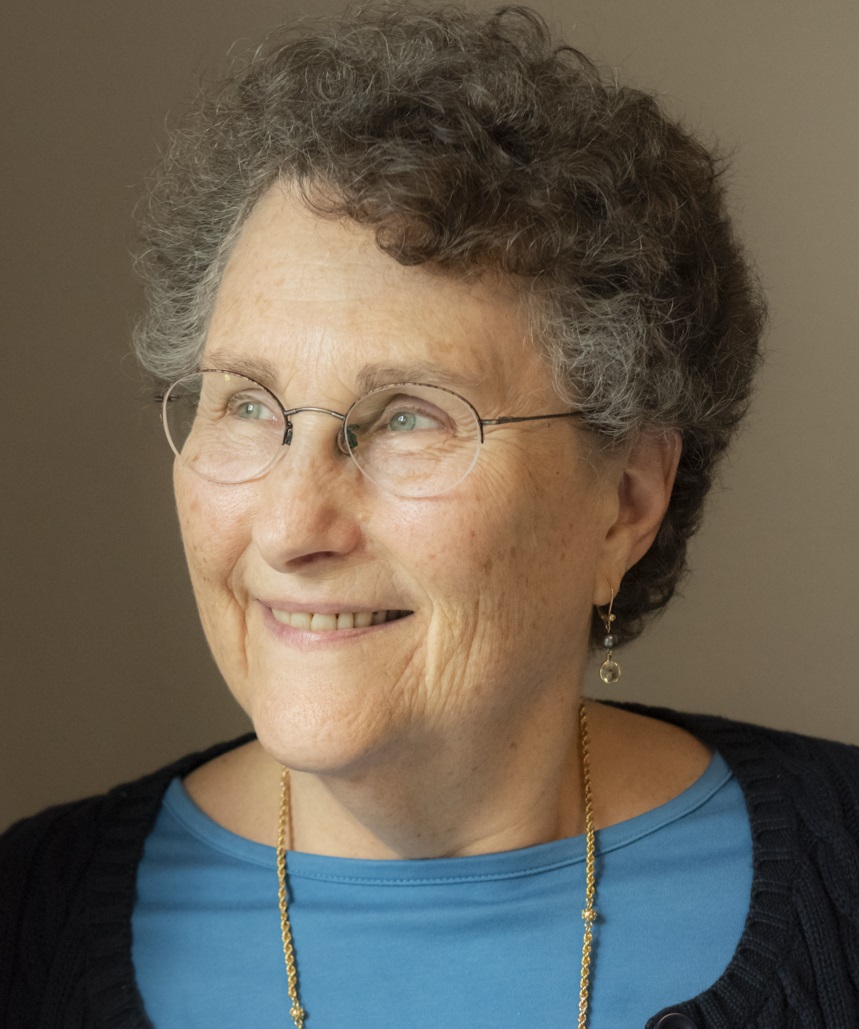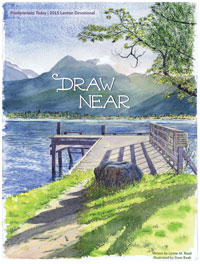Friendship, loneliness, and prayer: Praying to give affection extravagantly
Lynne Baab • Tuesday January 2 2024

Talk not of wasted affection; affection never was wasted.
If it enrich not the heart of another, its waters returning
Back to their springs, like the rain shall fill them full of refreshment;
That which the fountain sends forth returns again to the fountain.
—Henry Wadsworth Longfellow (1807-1882)
Have you ever given a small gift to a friend or family member, they thank you at the time, but then you never see or hear anything about the gift again? “What a waste,” you might think. Have you ever sent someone an email or text message to say you’re thinking about them, and you get no reply? Have you ever met someone who you think might be a friend, but every overture you make toward them gets no response?
I came across the quotation from Longfellow when I was a teenager, and it seemed relevant for making friends and nurturing friendships. A good number of the actions we take to show affection in friendships just don’t seem to land. They seem like wasted effort. But at the very least they shape and bless us — "That which the fountain sends forth returns again to the fountain."
I’ve mentioned before that we moved 12 times in my first 15 years, and making friends became an essential skill. My mother was an expert in making and keeping friends, so I had a good model. I watched her reach out, invite people over, make time for friends, buy small gifts, send Christmas cards, and make phone calls. (Those were the days before email and text messages.) I know she would say affection is never wasted. We don’t know who will respond to our affection, but someone will. She would say having friends requires a lot of initiative (which I wrote about a month ago).
This past week, for the first time, I charted my life pattern after I read the Longfellow quotation. I had never realized that after living three years in the same place during high school (hurrah!), I moved nine times between ages 18 and 34. After every one of those moves, I made new friends. I know the Longfellow quotation made a difference in all those friendship efforts. Knowing that affection is never wasted helped me reach out and care, over and over, to build new friendships.
Affection overlaps with initiative, but they are not identical. We might initiate with someone in a spirit of exploration — might this person grow to be a friend? — before we feel any affection. Most initiative, though, has a component of affection to it. But affection can also include words of gratitude for small and large things, as well as statements like, “I appreciate this time we’ve had together” and “What a great conversation! I’ve really enjoyed talking to you.” Those actions could be considered as initiative, because they involve a choice and action on our part. However, examining the ways we express affection can be helpful, while perhaps viewing those actions as a subset of initiative.
Affection might involve a light touch on the shoulder or a warm smile. Affection might include a text message, gift, card, or response on social media. I like to give and receive hugs, but I am aware that not everyone likes hugs. We probably get stuck in ruts in our patterns of showing affection, so I bet you can think of many additional forms of affection that are not a part of my affection repertoire.
On my 34th birthday, my husband Dave and I returned to Seattle after a year in Sweden, and my pattern of frequent moves slowed down. I was committed to the idea that affection is never wasted and that all forms of affection and initiative help us gain friends, even if any specific action of initiative or affection has no impact. Only a few years later, I came across an article by Gary Chapman about love languages. The ideas from his book, The Five Love Languages, were laid out clearly in that early article. (Frankly, I deeply appreciate his idea about love languages, but I don’t like the book very much. It feels overly simplistic and occasionally misogynistic. I can’t find that old article online, but here’s a fun research study about the five love languages.)
Chapman’s five love languages helped me understand that affection sometimes feels wasted because we show our appreciation for people in ways that don’t feel loving to them. A recent example for me is the gift of a plate of cookies, given to me right after I noticed I’d been eating too much sugar. I had begun to take steps to cut back. This gift — not my love language anyway — undermined my efforts to reduce sugar. Yes, I should have the discipline to pass up cookies that are in front of me, but I don’t. This person showed affection to me in a way that didn’t feel like affection.
At church recently, I received a precious hug from a six-year-old with whom I often chat. I squeezed her gently and then bent down to kiss the top of her head. She jumped back and threw herself on the floor. Her mom told me that she loves hugs but hates kisses. Good to know. Her response illustrates the challenges of showing affection with physical touch. Six-year-olds who dislike kisses are not the only people who have specific tastes regarding physical affection.
The fear of showing affection inappropriately can keep us from showing it at all. In some ways, I was better off between 18 and 34 when I believed all affection was good for others and for me, even if it felt wasted. I see now that we need God’s wisdom and the guidance of the Holy Spirit so that we can express affection in ways that don't damage our relationships. We can pray for God's help in the area of affection. In a world of caution and feelings of scarcity, we can also pray to express the abundance of God’s love through an appropriate abundance of affection.
Light of the World, the sun you created shines so much more light on us than we can ever receive. Empower us to reflect your abundance as we show affection to others. Guide us into wise and helpful ways to express affection to those we care about. Give us joy and freedom as we consider how to show that we care.
֍ ֍ ֍
In this series of blog posts called “Friendship, loneliness, and prayer,” I am alternating posts about praying for friendships with posts about praying about listening skills. Next week I’ll return to the topic of listening skills: "holy listening." Illustration by Dave Baab: sunset over Lake Steilacoom, Lakewood, Washington, the view from my mother's kitchen window. If you’d like to receive an email when I post on this blog, sign up below under “subscribe.”
Previous posts about abundance and goodness:
Next post »« Previous post
Subscribe to updates
To receive an email alert when a new post is published, simply enter your email address below.

Lynne M. Baab, Ph.D., is a teacher and writer. She has written numerous books, Bible study guides, and articles for magazines and journals. Lynne is passionate about prayer and other ways to draw near to God, and her writing conveys encouragement for readers to be their authentic selves before God. She encourages experimentation and lightness in Christians spiritual practices. Read more »
Lynne is pleased to announce the release of her book on grief and gratitude, designed to help people grieving from anything, including the pandemic, while also desiring to notice God's good gifts. Two Hands: Grief and Gratitude in the Christian Life is available in paperback, audiobook, and for kindle. Lynne's 2018 book is Nurturing Hope: Christian Pastoral Care for the Twenty-First Century, and her best-selling book is Sabbath-Keeping: Finding Freedom in the Rhythms of Rest (now available as an audiobook as well as paperback and kindle). You can see her many other book titles here, along with her Bible study guides.
Lynne recently spoke about empathy and also about bringing spiritual practices to life.
Lynne was interviewed recently for the podcast "As the Crow Flies". The first episode focuses on why listening matters and the second one on listening skills.
Here are two talks Lynne gave on listening (recorded in audio form on YouTube): Listening for Mission and Ministry and Why Listening Matters for Mission and Ministry.
"Lynne's writing is beautiful. Her tone has such a note of hope and excitement about growth. It is gentle and affirming."
— a reader
"Dear Dr. Baab, You changed my life. It is only through God’s gift of the sabbath that I feel in my heart and soul that God loves me apart from anything I do."
— a reader of Sabbath Keeping
Subscribe
To receive an email alert when a new post is published, simply enter your email address below.
Featured posts
- Drawing Near to God with the Heart: first post of a series »
- Quotations I love: Henri Nouwen on being beloved »
- Worshipping God the Creator: the first post of a series »
- Sabbath Keeping a decade later: the first post of a series »
- Benedictine spirituality: the first post of a series »
- Celtic Christianity: the first post of a series »
- Holy Listening »
- A Cat with a Noble Character »
- Welcome to my website »
Tags
Archive
- April 2024 (4)
-
March 2024 (5)
- Friendship, loneliness, and prayer: Praying about distractions from empathy
- Friendship, loneliness, and prayer: Praying to keep empathy flowing
- Friendship, loneliness, and prayer: Everyday initiative
- Friendship, loneliness, and prayer: Praying for guidance for ending conversations
- Friendship, loneliness, and prayer: Reflecting on the series
- February 2024 (4)
- January 2024 (2)
-
December 2023 (6)
- Friendship, loneliness, and prayer: Initiating
- Friendship, loneliness, and prayer: Praying about listening roadblocks
- Friendship, loneliness, and prayer: Praying to love the poverty in our friends
- Friendship, loneliness, and prayer: Praying for “holy curiosity”
- Friendship, loneliness, and prayer: Praying for “holy listening”
- Friendship, loneliness, and prayer: Praying to give affection extravagantly
- November 2023 (4)
-
October 2023 (5)
- Friendship, loneliness and prayer: A listening skill with two purposes
- Friendship, loneliness, and prayer: Saying “thank you” to friends
- Friendship, loneliness, and prayer: One more way reflecting helps us
- Friendship, loneliness, and prayer: Lessons from two periods of loneliness
- Friendship, loneliness, and prayer: Types of reflecting, a listening skill
- September 2023 (4)
- August 2023 (4)
- July 2023 (5)
- June 2023 (3)
- May 2023 (6)
- April 2023 (4)
- March 2023 (4)
- February 2023 (4)
- January 2023 (4)
- December 2022 (5)
- November 2022 (1)
- October 2022 (5)
- September 2022 (5)
-
August 2022 (6)
- Draw near: Confessing sin without wallowing
- Draw near: A favorite prayer about peace, freedom, and much more
- Drawing near with Desmond Tutu: God’s love is the foundation for prayer
- Draw near: Worshipping God with Desmond Tutu
- Draw near: Yearning, beseeching and beholding with Desmond Tutu
- Draw near: Praising God with Desmond Tutu
- July 2022 (2)
- June 2022 (6)
- May 2022 (5)
- April 2022 (6)
- March 2022 (5)
- February 2022 (4)
- January 2022 (3)
- December 2021 (5)
- November 2021 (4)
- October 2021 (5)
- September 2021 (4)
- August 2021 (4)
- July 2021 (4)
- June 2021 (4)
- May 2021 (4)
- April 2021 (5)
- March 2021 (4)
- February 2021 (4)
- January 2021 (4)
- December 2020 (5)
- November 2020 (3)
- October 2020 (5)
- September 2020 (4)
- August 2020 (4)
- July 2020 (5)
- June 2020 (4)
-
May 2020 (4)
- Spiritual diary of sheltering in place: The lifeline of separating thoughts from feelings
- Spiritual diary of sheltering in place: The lifeline of welcoming prayer
- Spiritual diary of sheltering in place: a kite string as a lifeline
- Spiritual diary of sheltering in place: The lifeline of God’s distant future
-
April 2020 (7)
- Spiritual diary of self-isolation: the lifeline of God’s constancy
- Spiritual diary of sheltering in place: The lifeline of accepting my place as a clay jar
- Spiritual diary of sheltering in place: the lifeline of memories
- Spiritual diary of sheltering in place: the lifeline of “Good” in “Good Friday”
- Spiritual diary of sheltering in place: The lifeline of “easier does not mean easy”
- Spiritual diary of sheltering in place: The lifeline of nature
- Spiritual diary of sheltering in place: the lifeline of God’s voice through the Bible
-
March 2020 (7)
- Important anniversaries in 2020: The first Earth Day in 1970
- Important anniversaries in 2020: Florence Nightingale was born in 1820
- Spiritual diary of self-isolation: Weeks 1 and 2
- Spiritual diary of self-isolation: God's grace as a lifeline
- Spiritual diary of self-isolation: The lifeline of limits on thoughts
- Spiritual diary of self-isolation: Wrestling with God for a blessing
- Spiritual diary of self-isolation: responding to terror by listening to Jesus voice
- February 2020 (4)
- January 2020 (5)
- December 2019 (4)
- November 2019 (4)
- October 2019 (5)
- September 2019 (4)
- August 2019 (5)
- July 2019 (4)
- June 2019 (4)
- May 2019 (5)
- April 2019 (4)
- March 2019 (4)
- February 2019 (4)
-
January 2019 (5)
- Nurturing friendships in a cellphone world: Jesus as Friend
- Nurturing friendships in a cellphone world: Friendship with Christ and friendship with others
- Nurturing friendships in a cellphone world: Who is my neighbor?
- Nurturing friendships in a cellphone world: Friendship as action
- Nurturing friendships in a cellphone world: Hymns that describe friendship with God
- December 2018 (3)
-
November 2018 (5)
- Connections between the Bible and prayer: Sensory prayer in Revelation
- First post in a new series: Nurturing friendships in a cellphone world
- Nurturing friendships in a cellphone world: Strong opinions and responses
- Nurturing friendships in a cellphone world: My conversation partners about friendship
- Nurturing friendships in a cellphone world: Two views about communication technologies
- October 2018 (4)
- September 2018 (4)
-
August 2018 (5)
- Providing Christian Care in Our Time
- Providing Christian care in our time: Seven trends in pastoral care today
- Providing Christian Care in Our Time: Skills for Pastoral Care
- Providing Christian care: The importance of spiritual practices
- First post in a new series: Connections between the Bible and prayer
- July 2018 (4)
- June 2018 (4)
- May 2018 (5)
- April 2018 (4)
- March 2018 (5)
- February 2018 (4)
- January 2018 (4)
- December 2017 (5)
- November 2017 (4)
- October 2017 (4)
- September 2017 (5)
- August 2017 (4)
- July 2017 (4)
- June 2017 (4)
-
May 2017 (5)
- My new spiritual practice: Separating thoughts from feelings
- My new spiritual practice: Feeling the feelings
- My new spiritual practice: Coping with feelings that want to dominate
- My new spiritual practice: Dealing with “demonic” thoughts
- My new spiritual practice: Is self-compassion really appropriate for Christians?
- April 2017 (4)
- March 2017 (5)
- February 2017 (4)
- January 2017 (4)
- December 2016 (5)
- November 2016 (4)
- October 2016 (4)
- September 2016 (5)
- August 2016 (4)
- July 2016 (4)
- June 2016 (4)
- May 2016 (5)
- April 2016 (4)
- March 2016 (5)
- February 2016 (4)
- January 2016 (4)
- December 2015 (4)
- November 2015 (4)
- October 2015 (5)
- September 2015 (4)
- August 2015 (4)
- July 2015 (4)
- June 2015 (4)
- May 2015 (4)
- April 2015 (6)
- March 2015 (4)
- February 2015 (4)
- January 2015 (4)
- December 2014 (5)
- November 2014 (4)
- October 2014 (4)
- September 2014 (4)
- August 2014 (5)
- July 2014 (4)
- June 2014 (7)





















